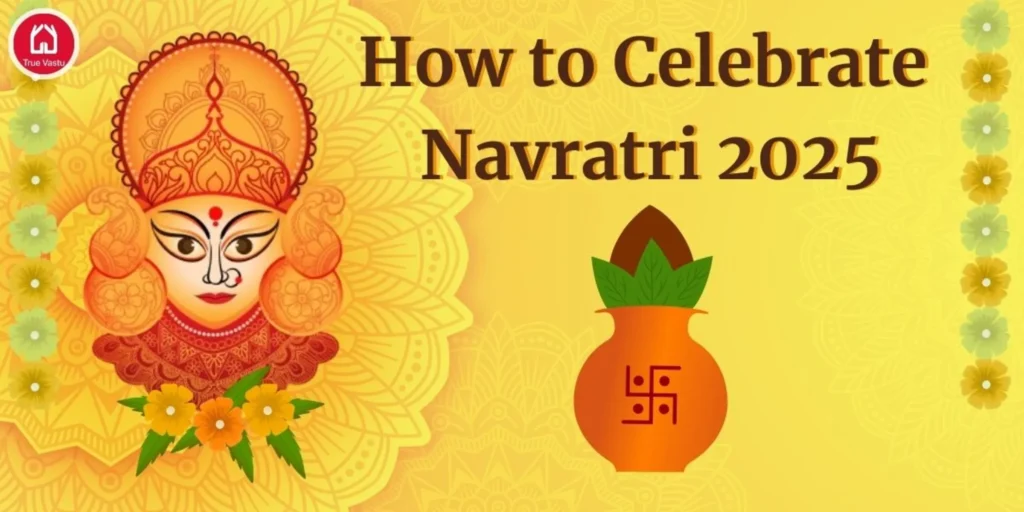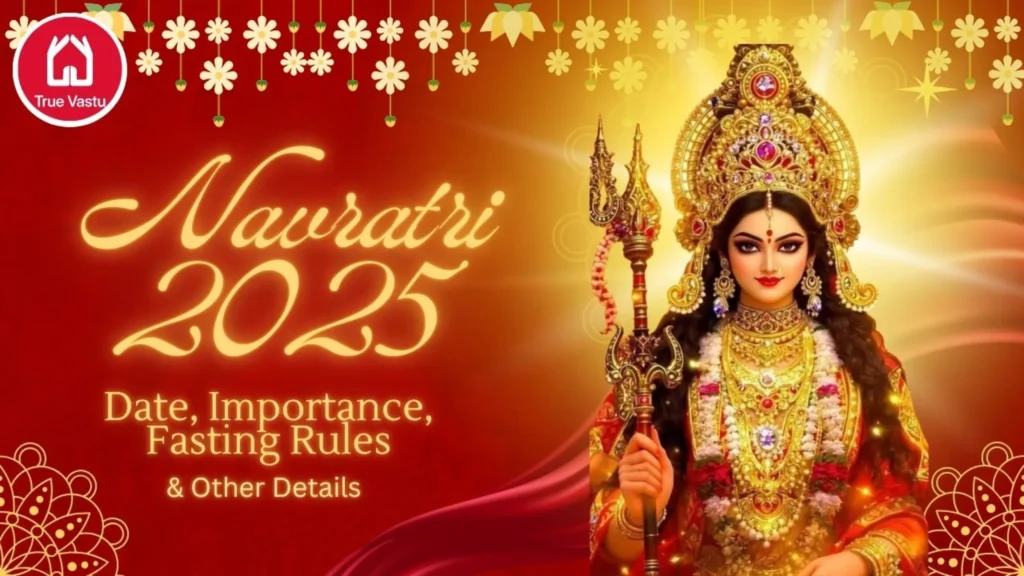Navratri is a famous Indian festival celebrated for nine days with prayers, dance, and fasting. It marks Goddess Durga’s victory over the demon Mahishasura.
Indians everywhere celebrate Navratri with happiness and deep devotion. In this blog, you will learn date for Navratri 2025 in september, navratri puja vidhi, importance and more.
Navratri 2025 Date in September
|
Festival |
Start Date |
End Date |
Days |
|
Navratri 2025 |
22nd September, Monday |
1st October, Wednesday |
9 Days |
How to do Navratri Puja at Home?
You need to follow some easy steps to do the Navratri 2025 puja at home for attaining Maa Durga’s blessings.
- Ghata Sthapana: Keep Maa Durga idol and a clay pot with barley.
- Kalash Sthapana: Fill pot with water, add flowers, leaves, coins, rice, and coconut.
- Durga Worship: Light a diya, offer flowers, incense, food.
- Chowki Sthapana: Spread roli, tie moli, place idol on chowki.
- Navratri Puja: Offer fruits, flowers, diya, food, and chant mantras.
- Aarti: Sing aarti, light diya, ring bell, and pray.
- Kanya Puja: On day 9, feed 9 girls and take blessings.
Spiritual Significance of Navratri
Shakti (The Creative Power): Shakti means energy. Nothing can be created without Shakti in this world. Navratri honours this powerful energy of the Goddess.
Balance in Life
Life has both masculine (strength, logic) and feminine (care, energy) qualities. Navratri teaches us to honour and value the feminine energy as well.
A Time for Growth
Honouring the goddess inspires us to grow, become better, and lead a life of kindness and wisdom.
Worship of the Goddess
During Navratri 2025, you worship three main goddesses:
- Durga – She removes negativity.
- Lakshmi – She gives wealth, energy, and courage.
- Saraswati – She blesses us with wisdom and learning.
Some people worship with big idols, while others do simple Navratri puja at home with flowers, lamps, and prayers.
Why Navratri Is Celebrated for 9 Days?
The nine days of Navratri mark Goddess Durga’s victory over the demon Mahishasura. The goddess won on the tenth day, which is further marked as Vijayadashami or Dussehra.
- What you learn: You learn from this story that no matter how evil and strong, goodness always wins in the end.
- Symbolism of Nine Nights: During these nine nights, you explore your inner journey, remove all the negativity and darkness, and crave for wisdom.
The Nine Days of Navratri
Daily Themes and Colours: Each day is dedicated to one form of the goddess, like Shailputri, Brahmacharini, Chandraghanta, etc. People also wear special colours each day, like red, yellow, or green, to connect with that energy.
Navratri puja: Families light a lamp (Akhand Jyoti), do aarti, and keep fasts. Each ritual has its own meaning.
The Three Qualities of Nature
Life is made of three natural qualities (called gunas):
- Tamas – laziness, rest.
- Rajas – action, energy.
- Sattva – purity, wisdom.
|
Phase |
Goddess Worshipped |
Focus / Teachings |
|
First Three Days (Tamas) |
Goddess Durga |
Remove negativity, practice discipline, and cleansing |
|
Middle Three Days (Rajas) |
Goddess Lakshmi |
Gain energy, build confidence, turn desires into devotion |
|
Last Three Days (Sattva) |
Goddess Saraswati |
Focus on wisdom, learning, peace, purity, and balance |
Too much tamas makes us lazy. Too much rajas makes us restless. Sattva helps us stay calm and clear.
Navratri helps us rise above these qualities and find balance.
Learn also:- God Face Direction in Home
The Ninth Day (Ayudha Pooja / Mahanavami)
On this day, people worship their tools, books, and instruments.
- Students pray with notebooks and pens.
- Workers worship their tools.
It shows respect for the things that help us study, work, and grow.
Why Do People Fast During Navratri?
Spiritual Reason: Fasting keeps us alert and helps us think of the goddess more.
Health Benefits: Light food during fasting gives our stomach a rest and improves digestion.

How to Celebrate Navratri 2025
Traditional Ways
- Light lamps and do navratri puja.
- Sing bhajans and offer food to the goddess.
Dance and Fun
- In Gujarat, people enjoy Garba and Dandiya.
- In Bengal, there are big Durga Puja celebrations.
Read More about: Vastu for Pooja Room
Modern Ways
Even if you can’t follow all rituals, you can celebrate by eating light, spending time with family, or meditating.
Traditions Across India
Navratri 2025 is not the same everywhere. Different states celebrate it in different ways:
- In Gujarat, people dance Garba and Dandiya all night.
- In West Bengal, it is celebrated as Durga Puja with huge pandals and idols.
- In South India, families keep dolls on steps (Kolu) and invite guests.
- In North India, the story of Ramlila is performed, and Dussehra marks the burning of Ravana’s effigy.
When and How Is Navratri Celebrated?
- Navratri is generally celebrated in autumn, during September or October.
- There are actually four Navratris in a year.
- The most significant Navratri is Sharad Navratri, which comes just before Dussehra.
- People perform Navratri puja during these nine days.
- Devotees keep fasts as part of the tradition.
- Singing bhajans is a common practice.
- People wear special colours each day.
- Celebrations include Garba and Dandiya dances.
Navratri is not just about fasting and rituals. It is about celebrating life, energy, and the power of the feminine. These nine days teach us to be strong like Durga, generous like Lakshmi, and wise like Saraswati.
So whether you dance Garba, take part in Durga Puja, or simply pray at home, remember, Navratri is a time to grow, learn, and celebrate being alive.
FAQ
Q: What can we eat in Navratri fast?
A: During Navratri 2025, you can eat fruits, milk, nuts, and dishes made with sabudana (tapioca).
Q: What is the story behind celebrating Navratri?
A: Navratri 2025 marks Goddess Durga’s win against the demon Mahishasura, reminding us that good always defeats evil.
Q: Can we drink coffee in Navratri fast?
A: Yes, many people do. It depends on family customs.
Q: When to break Navratri fast?
A: The fast is usually ended after sunset each day or on the ninth day after performing the Navratri puja.
Q: What is the significance of 9 days of Navratri?
A: Each of the nine days is for one form of Goddess Durga, teaching us strength, courage, and wisdom.
Q: Why do we have 9 colours in Navratri?
A: Each colour shows a special quality of the Goddess, like strength, peace, or devotion. Wearing them is a way to respect her.
Q: What does Navratri mean?
A: Navratri means “nine nights.” Each night we pray to a different form of Maa Durga.
Q: Are Durga and Parvati the same?
A: Yes. Both are forms of Goddess Shakti. Parvati is loving and caring, while Durga is strong and protective.
🕉️ This Navratri, bring positivity to your home with True Vastu. Contact us today: +91 77-88-99-3627 | +91 77-88-99-3819
